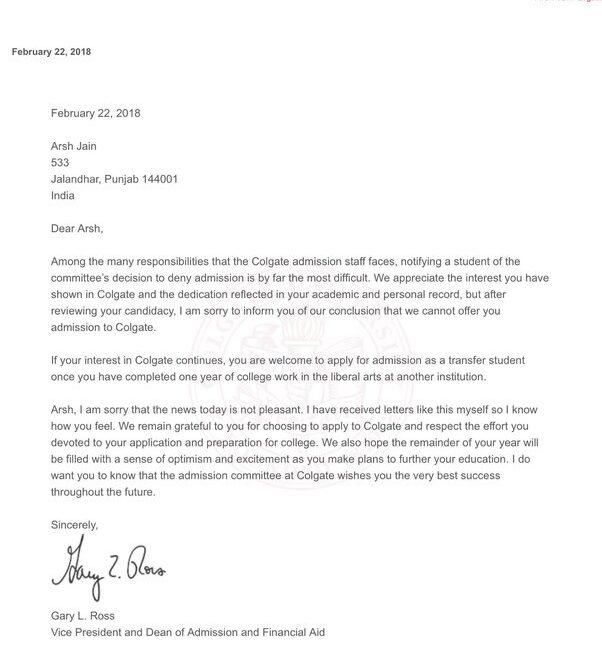If your university application is rejected, consider appealing or applying to other schools. Evaluate and improve your application for future submissions.
Facing a university application rejection can be disheartening, but it’s not the end of your academic journey. Many students experience setbacks and still achieve their educational goals. Start by carefully reviewing the feedback from the university, if provided. This insight can help identify areas for improvement.
Consider applying to other universities or exploring alternative educational paths, such as community colleges or vocational programs. Enhancing your application by gaining additional experience, such as internships or volunteer work, can also make a significant difference. Remember, persistence and adaptability are key to overcoming this hurdle and finding the right academic fit for your ambitions.

Credit: www.quora.com
Initial Reaction
Facing a university application rejection can be overwhelming. Your dreams might feel shattered, and you may feel lost. It’s important to handle this initial shock with care. Let’s explore how to manage this challenging moment effectively.
Stay Calm
First, take a deep breath. Staying calm is crucial. Panicking will not help. Instead, try to ground yourself. Find a quiet place to sit. Drink some water or take a short walk. These small actions can help you maintain composure.
Avoid making any hasty decisions. Give yourself some time to think. This will help you to approach the situation rationally.
Process Your Emotions
It’s okay to feel disappointed or sad. Allow yourself to process these emotions. Talk to a friend or family member. Expressing your feelings can be therapeutic. Writing in a journal can also help you understand your emotions better.
Consider engaging in activities that make you happy. Watch your favorite movie or go for a run. These activities can lift your spirits and provide a positive distraction.
Seek Feedback
Receiving a rejection letter from your dream university can be disheartening. But don’t lose hope. One of the most constructive steps you can take is to seek feedback on your application. Understanding why your application was rejected can provide valuable insights and help improve your future applications.
Contact Admissions
The first step to seeking feedback is to contact the admissions office. Many universities are open to providing feedback to applicants. You can either call them or send an email. Make sure to be polite and professional in your communication. Here’s an example of what you could say:
Subject: Request for Application Feedback
Dear [Admissions Office],
I hope this email finds you well. My name is [Your Name], and I recently applied for the [Program Name] at [University Name]. I was disappointed to learn that my application was not successful. I am writing to kindly request any feedback you might be able to provide regarding my application. Understanding where I may have fallen short would greatly help me in improving my future applications.
Thank you for your time and consideration.
Best regards,
[Your Name]
Identify Weak Areas
Once you receive feedback from the admissions office, focus on identifying weak areas in your application. Here are some common areas where applicants often fall short:
- Personal Statement: Was it clear and compelling?
- Letters of Recommendation: Were they strong and relevant?
- Academic Records: Did you meet the required GPA?
- Extra-curricular Activities: Were they meaningful and well-documented?
After identifying these areas, make a plan to address them. For instance, if your personal statement lacked clarity, you could seek help from a writing tutor. If your academic records were not strong enough, consider retaking some courses or gaining additional qualifications.
Evaluate Options
Receiving a rejection letter can be disheartening. But it’s important to stay positive and evaluate your options. This can open new paths to achieve your academic goals. Let’s explore some strategies to help you move forward.
Consider Other Universities
Don’t lose hope. There are many universities out there. Some may have less competitive entry requirements. Research schools with similar programs. Make a list of potential options. Apply to universities that align with your interests and goals.
Tip: Look for universities with rolling admissions. This can increase your chances of acceptance.
Look Into Alternative Programs
Think about alternative programs that match your career goals. Sometimes, related fields can offer similar opportunities. For example, if you aimed for a computer science degree, consider an information technology program. These programs might have different entry requirements but still lead to your desired career.
Here’s a quick comparison of potential alternative programs:
| Original Program | Alternative Program |
|---|---|
| Computer Science | Information Technology |
| Business Administration | Marketing |
| Mechanical Engineering | Industrial Engineering |

Credit: medium.com
Gap Year Opportunities
If your university application is rejected, consider a gap year. A gap year can be a chance to grow, learn, and gain new experiences. Explore various opportunities to make the most of this time.
Work Experience
Gaining work experience can boost your resume. It helps you develop skills and earn money. Look for internships or part-time jobs in your field of interest.
- Internships
- Part-time jobs
- Freelance projects
Internships offer valuable industry insights. Part-time jobs teach time management and responsibility. Freelance projects allow for flexibility and creativity.
Volunteering And Travel
Volunteering during a gap year can be rewarding. You can help communities and make a difference. It also looks great on your resume.
- Local community service
- International volunteering
- Environmental projects
Traveling expands your horizons. It exposes you to new cultures and languages. You can combine travel with volunteering or work abroad.
| Activity | Benefits |
|---|---|
| Internships | Industry insights, networking |
| Part-time jobs | Time management, responsibility |
| Freelance projects | Flexibility, creativity |
| Volunteering | Community impact, resume boost |
| Traveling | Cultural exposure, language skills |
Improve Your Application
A university application rejection can be disheartening, but don’t lose hope. You have the power to turn this setback into an opportunity for growth. Focus on improving your application to increase your chances of success next time. Here are some actionable steps to enhance your profile.
Enhance Academic Credentials
Strong academic credentials are crucial for university admissions. Start by evaluating your grades and test scores. Identify areas where you can improve. Consider retaking standardized tests like the SAT or ACT if your scores were low. Enroll in advanced courses or take online classes to boost your GPA.
A table of suggested advanced courses can guide you in the right direction:
| Subject | Advanced Course |
|---|---|
| Math | Calculus, Statistics |
| Science | Physics, Chemistry |
| English | Advanced Literature, Composition |
Seek help from teachers or tutors for subjects you find challenging. Improving your academic record shows dedication and can significantly strengthen your application.
Boost Extracurricular Activities
Universities value well-rounded students. Engage in extracurricular activities to demonstrate your interests and skills. Join clubs, sports teams, or volunteer organizations. Leadership roles and consistent participation are highly regarded. Here are some ideas for extracurricular activities:
- Student Government
- Debate Club
- Community Service
- Sports Teams
- Music and Arts
Document your achievements and roles in these activities. Create a portfolio to showcase your involvement and leadership. Highlighting these experiences can make your application more compelling.
Reapply Strategy
Facing a rejection from your dream university can be disheartening. But, don’t lose hope! Crafting a solid reapply strategy can significantly improve your chances of success. Let’s dive into two key areas you should focus on: Adjusting your personal statement and securing stronger recommendations.
Adjust Personal Statement
Your personal statement plays a critical role in your application. Begin by revisiting your previous submission. Identify areas where you can provide more clarity or better showcase your achievements. Ensure that your statement aligns with the university’s values and objectives.
- Highlight your unique experiences and skills.
- Showcase your academic and extracurricular achievements.
- Clearly state why you want to join that specific university.
- Proofread for grammar and spelling errors.
Consider seeking feedback from a mentor or a professional editor. Their insights can provide valuable perspectives and help improve your statement significantly.
Secure Stronger Recommendations
Strong recommendation letters can make a substantial difference. Aim to obtain letters from individuals who know your strengths well. This could be a teacher, a coach, or a supervisor. Ensure they can speak to your abilities and potential.
- Choose recommenders who have seen you excel.
- Provide them with a summary of your achievements.
- Give them plenty of time to write a thoughtful letter.
- Follow up and express your gratitude.
Providing your recommenders with specific points to highlight can make their letters more impactful. A well-written recommendation can significantly bolster your application.
Professional Guidance
Receiving a rejection letter from a university can be disheartening. Professional guidance can help you navigate this challenging time. Whether it’s career counselors or mentors, seek out advice to stay on track.
Consult Career Counselors
Career counselors can offer valuable insights. They understand the application process inside out. A counselor can help you understand why your application was rejected. They can guide you on how to improve your application for the next round. Career counselors also provide support in identifying alternative pathways to your goals.
Consider scheduling a one-on-one meeting with a career counselor. Bring your rejection letter and any feedback you received. This information can be pivotal in creating a new strategy. Career counselors can also assist with:
- Reviewing your resume and cover letter
- Providing interview preparation tips
- Suggesting additional courses or certifications
These steps can enhance your profile and boost your chances in the next application cycle.
Seek Mentorship
Mentorship can play a crucial role in overcoming rejection. A mentor can offer personalized advice and emotional support. They have often faced similar challenges and can provide a roadmap for success. Seek mentors who are in your field of interest. Mentors can help you with:
- Setting realistic goals
- Identifying strengths and weaknesses
- Building a strong network
Engage with alumni networks or professional organizations to find potential mentors. Reach out and ask for their guidance. A mentor’s experience can provide invaluable insights and encouragement.
By consulting career counselors and seeking mentorship, you can turn a rejection into a stepping stone for future success.
Maintain A Positive Outlook
Receiving a university application rejection can feel devastating. It’s crucial to maintain a positive outlook during this challenging time. Focusing on the future helps you stay motivated and keeps your long-term goals in sight. Here are some steps to help you stay optimistic and driven.
Stay Motivated
It’s easy to feel discouraged after a rejection. Remember, this is just one step in your journey. Many successful individuals faced rejections before achieving their dreams. Use this moment to fuel your determination. Embrace a growth mindset and believe in your ability to succeed.
- Keep a journal of your achievements and skills.
- Set small, attainable goals to boost your confidence.
- Surround yourself with supportive friends and family.
Keep Long-term Goals In Sight
Your long-term goals are the bigger picture of your journey. A university rejection is a small setback, not the end. Focus on what you want to achieve in the future. Reevaluate your goals and consider alternative paths to reach them.
| Step | Action |
|---|---|
| 1 | Review your career aspirations. |
| 2 | Research other universities and programs. |
| 3 | Seek advice from mentors or career counselors. |
By keeping your long-term goals in sight, you can maintain perspective. This helps you stay focused on achieving your dreams, regardless of setbacks.
Frequently Asked Questions
Can You Apply To A University Again After Being Rejected?
Yes, you can reapply to a university after being rejected. Improve your application and meet deadlines for better chances.
What To Do If Your Application Is Rejected?
Review the rejection reasons carefully. Improve your application based on feedback. Gather more experience or qualifications if needed. Reapply with a stronger application. Seek advice from mentors or industry professionals.
What To Do If You Don’t Get Accepted Into University?
Consider community college or online courses to improve your grades. Gain work experience or volunteer to enhance your skills. Reapply next year.
Do Universities Keep Rejected Applications?
Universities typically store rejected applications for a limited time, often for a year. Policies vary by institution.
Conclusion
Receiving a university rejection can feel disheartening. Stay positive and explore alternative options. Consider gap years, community colleges, or other universities. Seek feedback to strengthen future applications. Remember, rejection is not the end. It’s an opportunity to grow and find the right path for you.
Keep pushing forward and stay determined.
- What is the Difference between Common Application and University Application?
- How Much are University Tuition Fees in the UK: 2024 Cost Guide
- What to Do If Your University Application is Rejected: Complete Guidelines
- Why It is Important in the University Application Process: Key Insights
- Difference between State University And Private University: Key Insights
- When Does University Application Open for 2025: Key Dates Revealed
- Is It Better to Apply Early for University: Unveil the Advantages
- Can You Claim University Application Fees on Taxes Canada: Find Out Now
- How Will University Benefit from Having You on the Course? Discover!









2 thoughts on “What to Do If Your University Application is Rejected: Complete Guidelines”